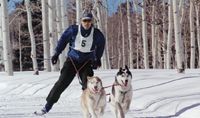Putting skijoring on the map of winter sports
On any winter weekend, you'll find Steven Bethka, OD, on a Colorado mountain skijoring.
On any winter weekend, you'll find Steven Bethka, OD, on a Colorado mountain skijoring.
Ski what-ing?

Of course, it helped that Dr. Bethka owned two Siberian Huskies who were accustomed to pulling him around town while he was rollerblading. Dr. Bethka was already an experienced downhill and cross-country skier, so the sport was a natural fit.
Still, every sport has a learning curve. When first practicing, Dr. Bethka admits to a few spills.
"It does help to be an experienced skier," he said, adding that any breed of dog that enjoys running and weighs at least 20 pounds can skijor. "If you run over your dogs or always fall, your dogs aren't going to be real happy with you or the sport."
Since Grand Junction gets cold but doesn't attract much snow, Dr. Bethka uses a mountain scooter to train his dogs around the city. The scooter features handbrakes and BMX tires-front and back-and a solid platform to stand on that's similar to a skateboard. So one or two days a week, while he stands on the scooter, Dr. Bethka's dogs pull him as fast as they can run. When there's snow, he takes them to nearby mountains.
Practice makes perfect
When Dr. Bethka is not training his dogs or himself, he organizes races for a local dog club called, Colorado Mountain Mushers.
There are three kinds of races: marathons or distance races that are usually 100 miles or more; mid-distance races, which average between 20 and 50 miles; an, sprint races, which are between 4 and 10 miles.
During the past several years, Dr. Bethka has participated in roughly 50 sprint races. He won first and second place in several state competitions. Dr. Bethka has also encouraged his two sons and foster children to get involved in the dogsled part of the sport. Several years ago, he earned another accolade-mentor of the year-from the dog club for his work with foster children.
But the summers can be rough. So he satisfies his craving to compete by racing stock cars around a nearly half mile oval dirt track named Thunder Mountain Speedway. In 2004, the local track awarded him Rookie of the Year.
Still, Dr. Bethka's heart belongs to skijoring. He doesn't plan on giving up the sport anytime soon. For now, Dr. Bethka, who is 49 years old, continues to strap on his cross-country skis and attach a harness to himself and his dogs when the snow is deep and the weather is a mild 20 degrees.
"I still have time to get better if I really work at it," he said.

FYI
Steven Bethka, OD
Phone: 970/245-7850
E-mail: sjbod@bresnan.net
Dr. Bethka did not indicate a financial interest in the subject.
Newsletter
Want more insights like this? Subscribe to Optometry Times and get clinical pearls and practice tips delivered straight to your inbox.